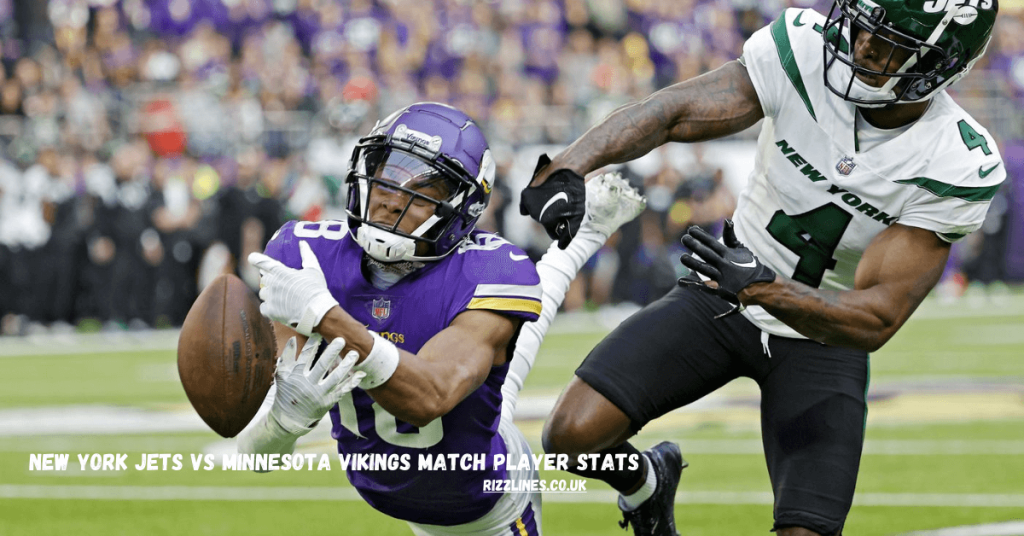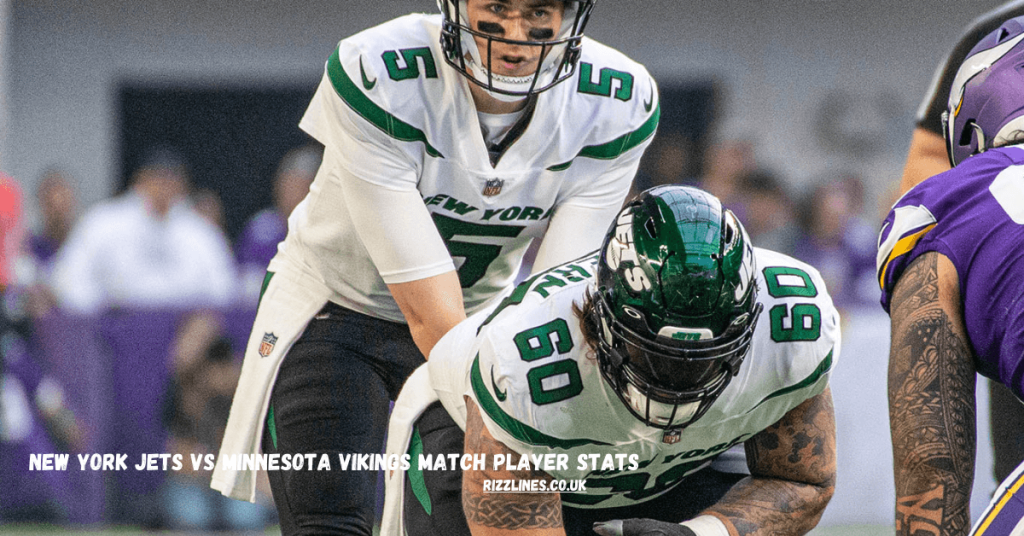The New York Jets enter this season with a renewed sense of purpose. With a strong roster blending young talent and experienced leadership, they are positioning themselves as serious playoff contenders. A solid draft strategy has allowed them to build depth, particularly in their defensive unit, which has shown promise in recent games. Head coach Robert Saleh has implemented an aggressive playing style, focusing on defensive intensity and an efficient offensive approach.
Despite challenges in past seasons, the Jets have displayed signs of improvement, particularly with their offensive execution. Quarterback Zach Wilson’s development is crucial, as his connection with key playmakers like Garrett Wilson and Breece Hall continues to evolve. The Jets’ ability to maintain consistency on both ends of the field will play a critical role in determining their success against a formidable Vikings team.
Minnesota Vikings
The Minnesota Vikings are known for their disciplined approach to the game, balancing an effective offensive scheme with a defensive lineup that can disrupt even the best teams. Led by head coach Kevin O’Connell, the Vikings have emphasized an aggressive passing game complemented by a strong running attack. Their offensive success hinges on Kirk Cousins’ ability to maintain efficiency under pressure while utilizing his top-tier receiving targets.
Defensively, Minnesota’s pass rush and secondary remain key focal points. The presence of Eric Kendricks and Danielle Hunter ensures that their defensive front can put pressure on opposing quarterbacks. However, their ability to contain the Jets’ offense will depend on their secondary’s ability to limit deep plays and control the tempo of the game.
Player Statistics Breakdown
Quarterbacks
Zach Wilson (New York Jets)
Zach Wilson has shown flashes of brilliance throughout the season, but consistency remains a challenge. With a completion percentage of 62.5% and a quarterback rating of 85.7, he has demonstrated the ability to move the chains effectively when given the right protection. His ability to reduce turnovers while improving his deep-ball accuracy will be pivotal against Minnesota’s defensive scheme.
One of Wilson’s biggest assets is his mobility, allowing him to extend plays and escape collapsing pockets. Against a defense that thrives on pressure, his quick decision-making and ability to connect with key targets like Garrett Wilson will be essential in securing a positive outcome.
Kirk Cousins (Minnesota Vikings)
Kirk Cousins remains one of the most reliable quarterbacks in the league, boasting a 68.3% completion rate and an impressive quarterback rating of 104.9. His ability to spread the ball effectively and make smart decisions under pressure makes him a constant threat. With 2,750 passing yards and 21 touchdowns, he has solidified his role as a leader in the Vikings’ offensive strategy.
Cousins’ chemistry with Justin Jefferson has been a major factor in Minnesota’s offensive efficiency. His ability to read defenses and deliver accurate throws will be crucial against a Jets defense known for creating turnovers and applying pressure in the backfield.
Running Backs
Breece Hall (New York Jets)
Breece Hall has emerged as a crucial playmaker for the Jets, amassing 820 rushing yards with a solid 5.1 yards per carry. His ability to find gaps in the defense and break tackles has made him a key asset in the Jets’ ground attack. His explosiveness allows him to turn short gains into significant yardage, keeping defenses on their toes.
With the Vikings focusing on containing the passing game, Hall’s ability to establish dominance on the ground will help the Jets maintain offensive balance. If he can exploit gaps in Minnesota’s defensive line, he could play a decisive role in controlling the tempo of the game.

Dalvin Cook (Minnesota Vikings)
Dalvin Cook continues to be a dominant force in the Vikings’ backfield, contributing 950 rushing yards and averaging 4.9 yards per carry. His combination of speed and power makes him one of the most dangerous running backs in the league. With seven touchdowns already this season, he remains a consistent red-zone threat.
Cook’s ability to contribute in the passing game also adds versatility to Minnesota’s offensive playbook. His ability to break through tackles and create explosive plays will be a key factor in neutralizing the Jets’ defensive aggression.
Wide Receivers
Garrett Wilson (New York Jets)
Garrett Wilson has been a revelation for the Jets, recording 930 receiving yards and 60 receptions. His speed and route-running ability make him a nightmare for defenders, and his chemistry with Zach Wilson has continued to improve throughout the season. His ability to stretch the field will be critical in breaking down Minnesota’s defensive coverage.
As one of the most reliable targets in the Jets’ offense, Wilson’s ability to capitalize on mismatches could significantly impact the outcome of the game. If he can maintain his high catch efficiency, he will be a primary target in crucial situations.
Justin Jefferson (Minnesota Vikings)
Justin Jefferson has established himself as one of the elite receivers in the NFL, with 1,320 receiving yards and 80 receptions. His elite hands and ability to make contested catches set him apart as a true game-changer. His explosiveness after the catch makes him a constant threat for long-yardage plays.
The Jets’ defense will need to employ a strong coverage strategy to contain Jefferson’s playmaking ability. If he finds openings in the secondary, he has the potential to tilt the game in Minnesota’s favor with his game-breaking skills.
Defense
New York Jets Defense
The Jets’ defense has been one of their strongest assets this season, recording 32 sacks and 11 interceptions. Led by Quinnen Williams and Sauce Gardner, their ability to disrupt opposing quarterbacks has been a key factor in their defensive success. Their aggressive pass rush and disciplined secondary make them a formidable unit.
Containing Kirk Cousins will be a primary objective for the Jets’ defense. If they can generate consistent pressure and force quick decisions, they can create opportunities for turnovers and defensive stops.

Minnesota Vikings Defense
The Vikings’ defensive unit, anchored by Eric Kendricks and Danielle Hunter, has been effective in applying pressure and forcing turnovers. With 27 sacks and nine interceptions, they have shown flashes of dominance, but their secondary has struggled at times against elite passing offenses.
If Minnesota’s defense can neutralize Zach Wilson’s passing attack and limit Breece Hall’s production, they will have a strong chance of controlling the game. Their ability to adjust to New York’s offensive strategies will determine their overall effectiveness.
Key Matchup to Watc
One of the most crucial matchups in this game will be the battle between the Jets’ defensive front and the Vikings’ offensive line. If the Jets’ pass rush can disrupt Kirk Cousins’ rhythm, it could force mistakes and limit the Vikings’ offensive efficiency.
Conversely, if Minnesota’s offensive line provides adequate protection, Cousins will have the time to connect with his playmakers, potentially creating a high-scoring affair. This battle in the trenches will be a key determinant of the game’s outcome.
Conclusion
The New York Jets vs. Minnesota Vikings matchup promises to be a thrilling contest between two talented teams aiming for playoff contention. With high-stakes performances expected from key players on both sides, fans can anticipate an action-packed showdown. Whether it’s the quarterbacks’ precision, the running backs’ explosive plays, or the defensive battle, every moment will contribute to the excitement of the game.
As both teams prepare to leave it all on the field, this matchup serves as a defining test for their playoff aspirations. With strong game plans and key performances, the winner of this battle could gain significant momentum heading into the rest of the season.
READ ALSO: Microsoft Ink
